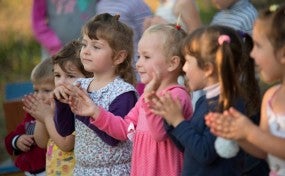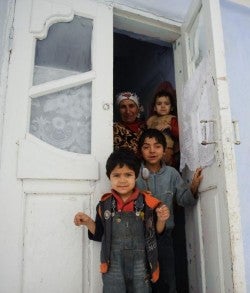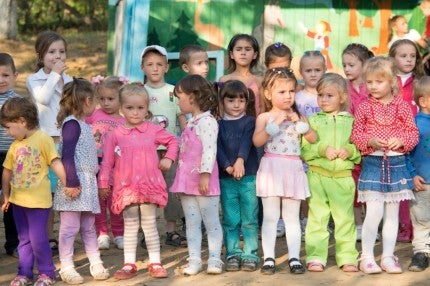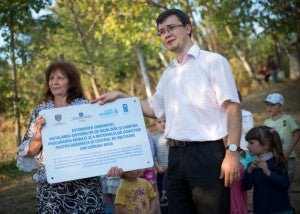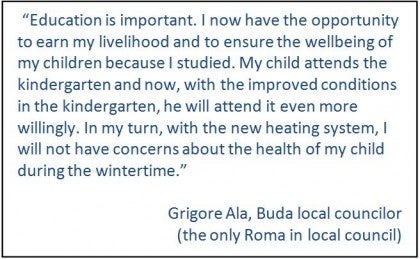Giving Romani children access to kindergarten and mothers a chance to find jobs in rural Moldova (Buda commune)
Date:
The community of Buda is located in Central Moldova, over 52 km away from Chisinau, the capital of Moldova, and consists of two villages – Buda and Ursari. The village of Buda is the largest village, and is populated by Romanian-speaking ethnic Moldovans. The smaller village of Ursari is inhabited predominantly by Roma, majority of whom speak only Romani. The overall population of the community is 1105 persons, of whom 802 live in Buda and 303 live in Ursari.
There is one kindergarten and one primary school in Buda village. The primary medical post and the mayor’s office are also both located in Buda. There are no public buildings or institutions in Ursari.
The only kindergarten was built in 1975 and has the nominal capacity of 40 places. Before JILDP intervention Roma families from Ursari village had limited or no possibility for enrolling their children into the Buda kindergarten. The reasons were several: long distance between their village and Buda, lack of community transport, mutual mistrust, prejudices and stereotypes between Roma and non-Roma population and social exclusion of Roma. In addition, the kindergarten conditions were not adjusted to specific needs of Romani girls and boys, who did not speak Romanian language. And many parents, both Roma and Moldovan were reluctant to send their child in the local kindergarten because of its poor material and sanitary conditions, and lack of functioning heating system.
Thus before September 2012 around 27-28% of the local kindergarten age children, mainly Roma, were deprived of access to pre-school education. According to mothers and grandmothers, who had to stay home to take care of their children, they were hopeless to get any job, and very limited possibility to deal with family or personal issues outside the village.
As a result of the significant renovation and installation of the new heating system the kindergarten can now accommodate 50 children from both Roma and non-Roma villages.
Change came with the community mobilization for empowerment initiative implemented by the JILDP. As a part of the community profiling exercise a lack of access to pre-school education, particularly acute for Romani families, was identified as one of the key human rights and gender concerns in both villages. Acknowledgement of the problem by the local public authorities and the community was the first step of the community mobilization. At the next stage, the Programme helped forming a community initiative group of parents and kindergarten teaches to advocate for addressing the situation, and for including it into the Buda Local Socio-Economic Development Strategy.
Supported by JILDP, the community initiative group developed a project proposal on improved of access of boys and girls to the pre-school education. The project proposal development was highly participatory process and involved Roma and non-Roma parents, representatives of local public authorities. This joint work helped to bridge both communities, having common problem they were willing to solve. Once developed by the community, the proposal received a financial support of the Joint Integrated Local Development Programme of the Government of Moldova, implemented by the UNDP and Women with a financial support of the Government of Sweden.
The Community initiative group closely monitored the kindergarten renovation process, advised on procurement of necessary furniture, equipment and supplies, educational and didactic materials. To ensure fair distribution of additional places in the renovated kindergarten, the community group advocated for and agreed with the local authorities and the kindergarten management a number of additional measures, which in the end contributed to Roma social inclusion in the communty:
- allocation of transport to bring the children from Ursari to the kindergarten in Buda;
- quota for at least 6 Romani children from Ursari in the kindergarten;
- hiring of a Roma staff to the kindergarten to facilitate communication between the Romani-speaking children from Ursari and the kindergarten staff as well as help children to learn Romanian language.
With the project accomplishment, 50 children (21 boys and 29 girls), including 10 from Roma families, 2 from single-parent families, 6 children in grandparent’s care, received access to the kindergarten with improved sanitary conditions and heating, thus being able to exercise their right to education.
The community initiative group and the community mobilize took the responsibility for monitoring of the progress with employment of the mothers who had stayed home taking care of children. The results of the monitoring will be discussed at the community meetings.
The community project was implemented as part of the Joint Integrated Local Development Programme, implemented by the Government of Moldova with the assistance of UNDP, UN Women and financial support of the Government of Sweden.
